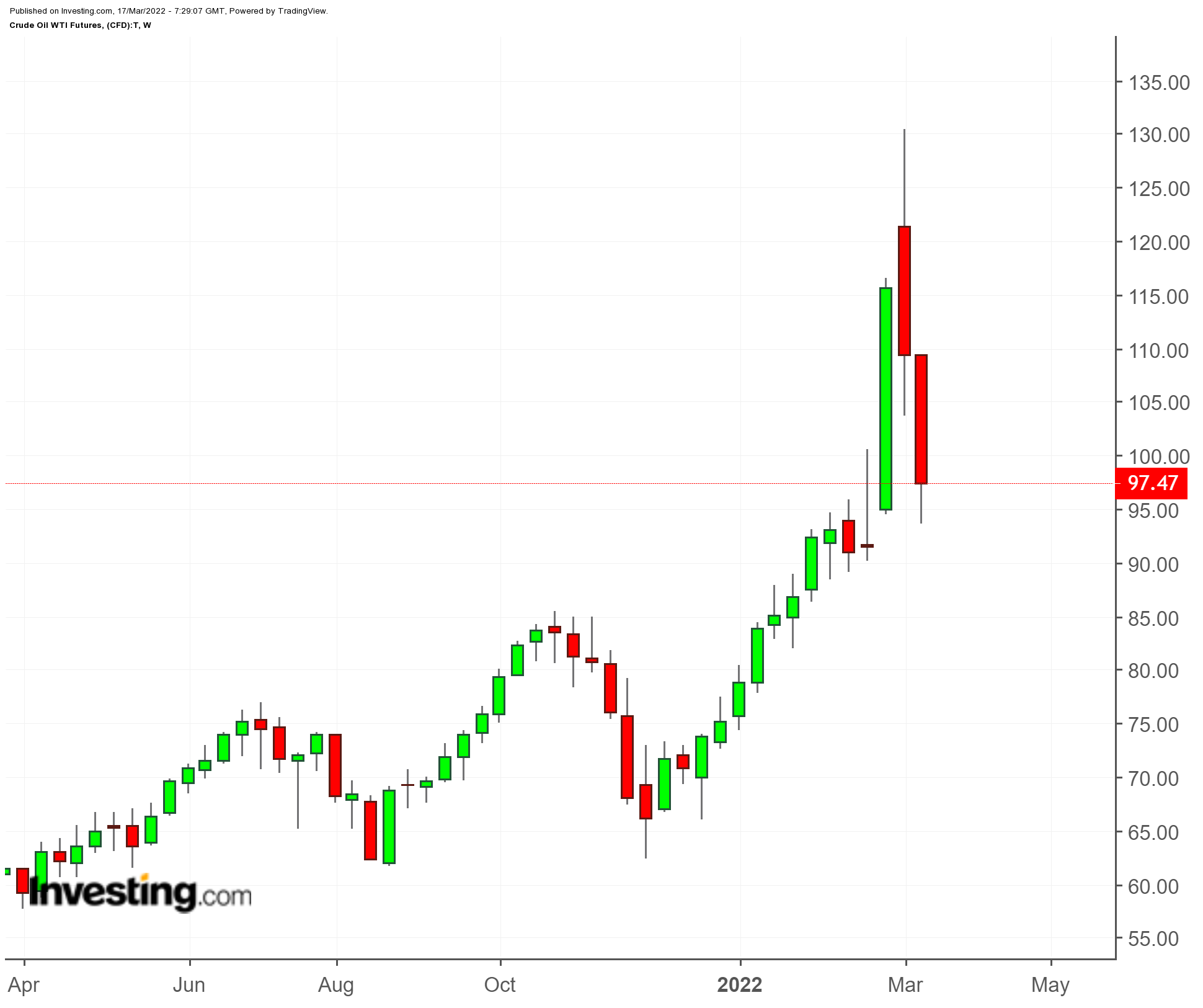After last week's oil market price spikes, when on Mar. 8 WTI closed just above $123 and Brent climbed to almost $128, the first half of this week saw a major drop in prices. Both the crude oil and Brent benchmarks fell more than 25% into the mid to high $90 per barrel range.

Still, these prices are quite high when compared to what the market saw at the end of 2021, but they reflect a significant drop from last week’s triple digit peaks, when we nearly hit new records for the energy commodity. At time of publication, Brent has once again started inching past the $100 level and crude too appears to be heading back in that direction.
Of course, there are still some reasons for prices to stay high and perhaps continue higher—largely because of sentiment and fears around geopolitical events. However, it is important to examine some of the elements that could have caused prices to drop, in order to understand where the market could go from here.
Four major things to focus on:
1. Is speculatory hysteria wearing off?
Fundamentals and even the fear of disruption from a Russia/Ukraine war were never enough to justify record prices. OPEC has taken this relaxed position since the hostilities and price escalation began.
However, the oil market is not purely based on fundamentals. It’s also based on trader sentiment—people who are sitting behind computers in New York, London, Hong Kong, Singapore, Buenos Aires, and Mumbai.
The run-up in prices we saw based on fears of market disruption from a Russia-Ukraine conflict were reasonable because the war and reactions to it dominated the news. Uncertainty also fueled the price build up. The war is still dominating the news, but speculation seems to have relaxed with time, especially as uncertainty over sanctions becomes more hard-and-fast.
Some have also mentioned that the price drop could be due to traders closing out their contracts for the month.
2. Will Continental Europe stop buying Russian energy?
They can't and they won't. Early in the conflict there was a perception that Europe might cut itself off from Russian oil, gas and coal, but it now seems as though this is a step European countries are not willing (or able) to take.
For instance, Germany cannot and will not separate itself from Russian energy supplies. Europe is not going to sacrifice its own social and economic wellbeing for a diplomatic effort. Now that this is clear, prices are starting to reflect a more reasoned perception.
3. Are other countries willing to buy Russian energy?
News broke this week that India is buying Russian oil—at a discount—and could buy even more. This was inevitable as soon as talk of sanctions against Russia began.
There are simply too many strong markets in the world that want cheap oil. This means neither the U.S. nor anyone else can prevent these markets from buying Russian oil.
China wants, needs, and continues to buy Russian oil and gas through direct pipelines. India, with more than 1.3 billion people, requires and must find the best deals it can get on oil, including Russian oil.
Due to the political pressure not to buy Russian oil, companies that are offering it for sale are doing so at significant discounts. When Russian oil is sold at a discount, the price of oil in general drops.
4. Coronavirus lockdowns in China
China has enacted lockdowns in Shanghai and Shenzhen, which have likely caused oil prices to drop as well. According to CNN, 37 million people in China are currently under lockdown. Only essential workers are permitted to leave their homes in these regions. In Shanghai, traffic is down by 36%, which is fueling concerns that these lockdowns could cause a noticeable drop in oil demand from China.
Additional events that could also spur volatility
Nevertheless, the market is still subject to extreme volatility and any number of events could cause price swings that would be similar to the swings we saw earlier this week. Some additional things traders should keep in mind as they continue to assess the market:
- A breakdown in talks between Ukraine and Russia and increased Russian military activity;
- The potential for new COVID restrictions in the US and Europe in reaction to China’s lockdowns. Some authorities are warning of the potential for rising cases even as travel and mask restrictions are being eased globally;
- Increased demand for gasoline and jet fuel as we head into warmer months and the summer driving and travel season;
- Falling Russian oil production if Russia is unable to sell enough oil and runs out of storage. (Russian oil production did increase in February, according to Platts, but remains under its OPEC+ quota);
- A reversal of OPEC+’s current policy of gradual production increases when the group meets on Mar. 31;
- New or additional sanctions on Russian energy from the United States or other nations;
- A resolution to the Iran nuclear deal that ends oil sanctions on Iran;
- Continued high inflation rates in the US and elsewhere. When the value of the U.S. dollar falls, the price of oil rises since it is usually traded in dollars. However, slowing economies globally do lead to less oil demand, which in turn drops the price of oil.
Author's Note: Though this column usually appears on Thursdays, it will only be published sporadically over the next 2 months. It will return to it's regular weekly schedule in mid-May.
